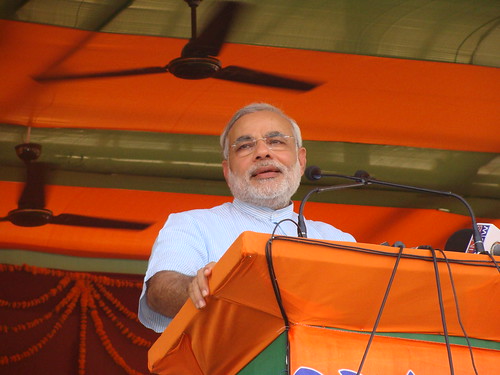By TCN Staff Reporter,
Ahmedabad: Ruling BJP has swept the polls to six municipal corporations, Ahmedabad, Surat, Vadodara, Rajkot, Jamnagar and Bhavnagar, retaining power with two-thirds majority in all but one of them.
The polls were held on October 10 and results declared today October 12.
While Ahmedabad, Vadodara, Surat, Rajkot and Bhavnagar clearly went to the BJP, the Congress showed an extremely poor performance with its strength of seats going down in these five corporations from what it was in 2005.

TCN Photo
Infighting within the Congress and delayed selection of candidates along with its failure to project the party as a strong opposition, are being pointed out as the main reasons for the party’s humiliating defeat in the local bodies elections.
Deep polarization
More importantly the results indicate deep polarization of the civil society on communal lines, as about 50 per cent of the Congress winners are Muslims from Muslim majority wards in all the six cities. This gave the BJP an opportunity to portray Congress as a Muslim party in Gujarat.
In fact, one of the BJP’s Muslim candidates-Babyben Sama-has also won from Rajkot, a BJP stronghold. BJP had fielded a total of 12 Muslim candidates, including a retired IPS official Abdullah Saiyed. But Saiyed lost by a margin of 1500 votes.
Modi, according to media reports, wanted to make Saiyed as Ahmedabad’s mayor to improve his popular image from being an anti-Muslim to a liberal politician. But with Saiyed losing the polls, his plan, at least for the time being, has crashed down.
No anti-incumbency
It is very interesting that there is no impact of anti-incumbency on the BJP in spite of the fact that the party has been in power for the last 15 years and yet.
Social activist Dr. Yaqoob Memon says that it is the symptom of urbanization. According to him, in urban areas all over the world, societies generally tend to support religion based political parties, which could be seen in Malaysia, Indonesia and even in Turkey and Egypt.
Though India’s urban population’s percentage is 30 per cent, it is 42 per cent in case of Gujarat. The BJP had raised religion-based issues during the election campaign.
Communalized the election campaign
Modi had repeatedly raised Sohrabuddin’s issue. When Congress objected to the decision by the state government to install 128-metre tall statue of Sardar Patel in the upstream, as violation of electoral code of conduct, Modi retorted back saying Congress did not want to honor Sardar Patel as it wanted to set up a statue of Sohrabuddin Sheikh at Ahmedabad’s main business centre of Manek Chowk.
By raising Sohrabuddin issue, he communalized the whole issue and only wanted to polarize the electorates on communal lines.
According to the well known human rights activist and political commentator J S Bandukwala, poll results confirm deep polarization of Gujarati society.
“So, there is a deep form of Islamophobia in Gujarat’’, he says.
Absence of caste benefits BJP
He explains the reason why the BJP’s tactic of communal polarization doesn’t work so successfully in states like Bihar and UP as it does in Gujarat.
Bandukwala argues that the caste identities in UP and Bihar acts as an obstruction to BJP’s aims but in Gujarat the saffron party is able to transcend all caste barriers.
This is so because Brahmin or upper caste leadership is negligible in the state BJP After 200 riots, average Hindu Gujarat has begun to see in Modi as their savior leading to deep penetration of BJP and Modi among common Hindus.
“And it is regrettably compounded by a weak opposition and absence of
left leaning party’’, he adds.

